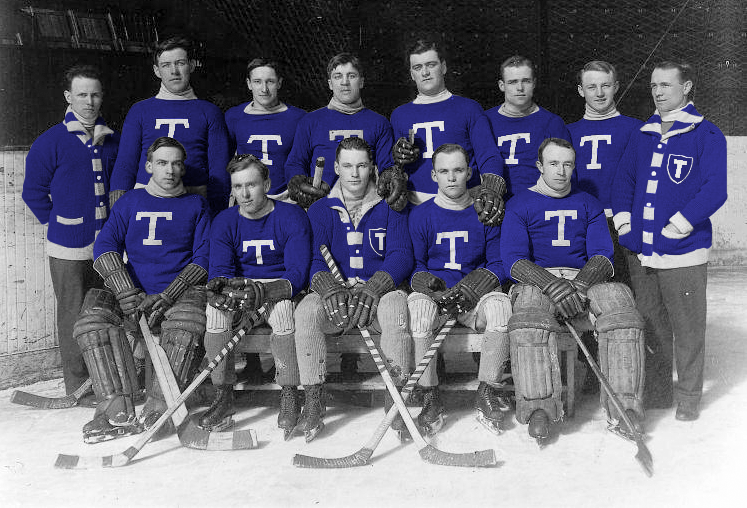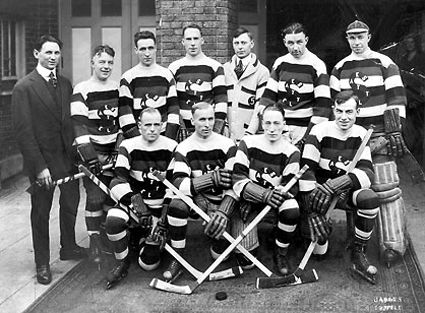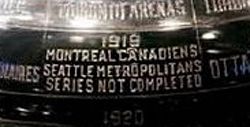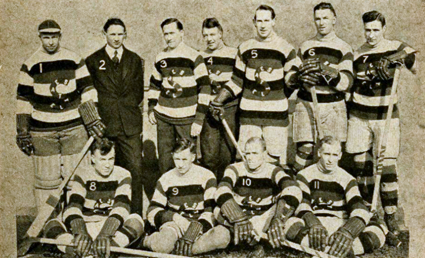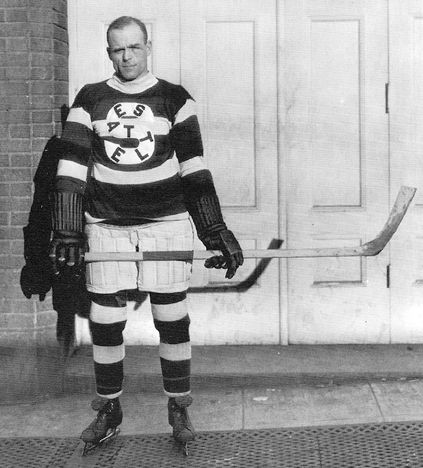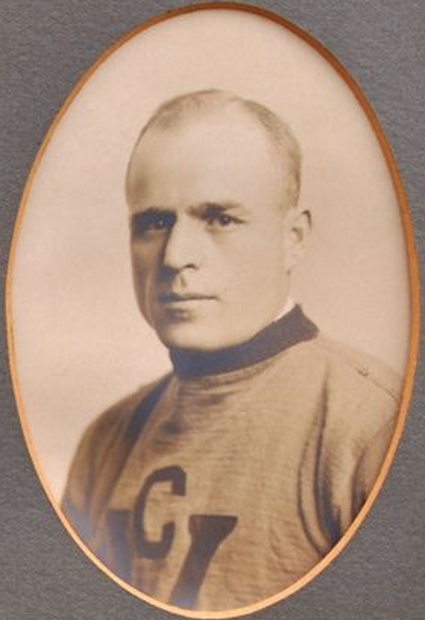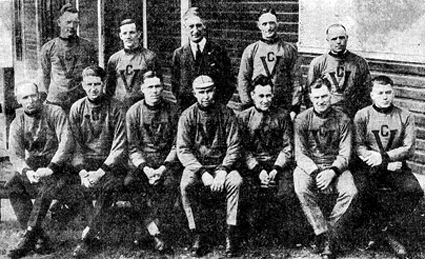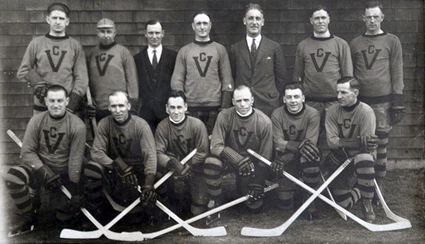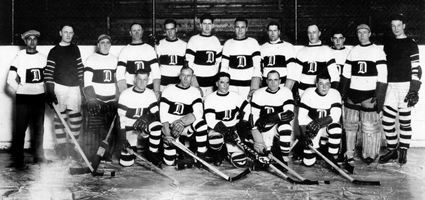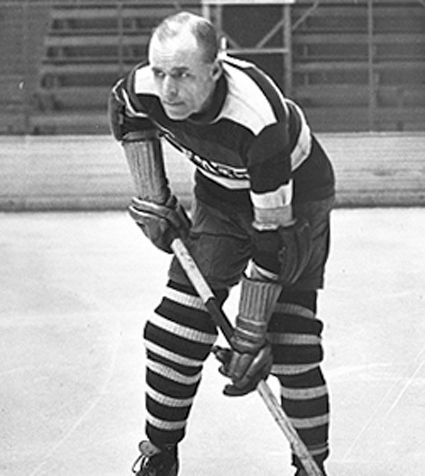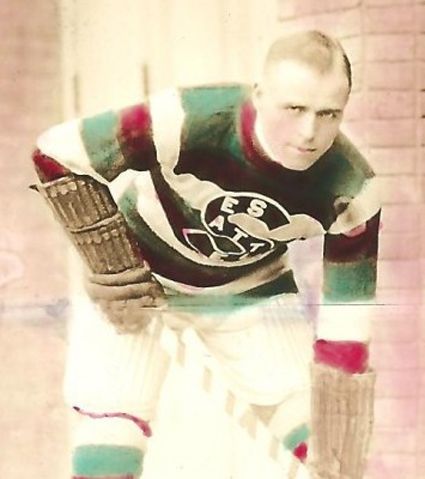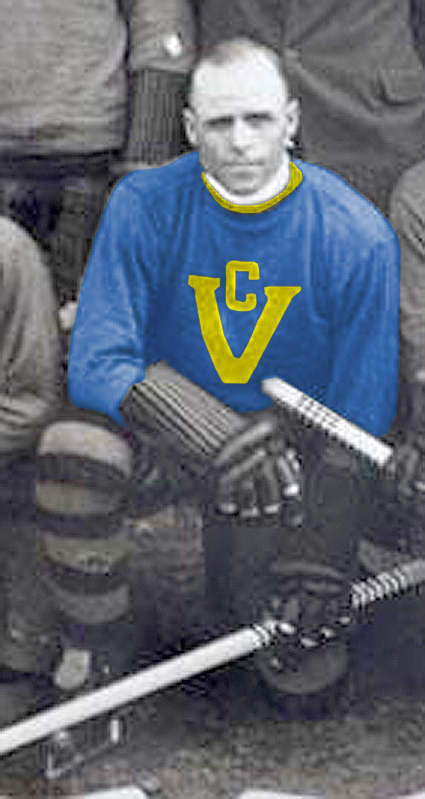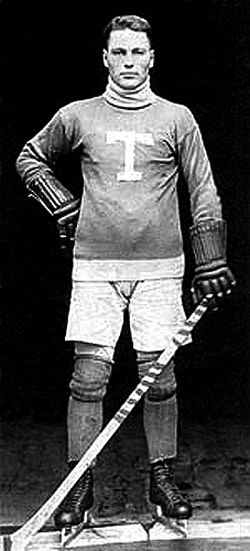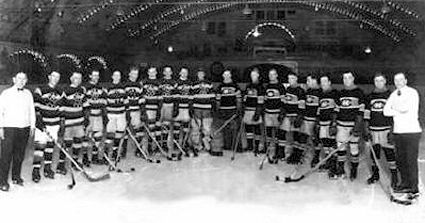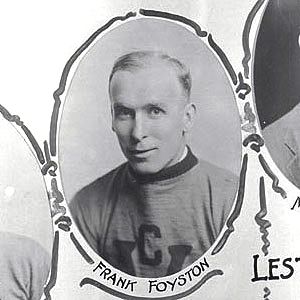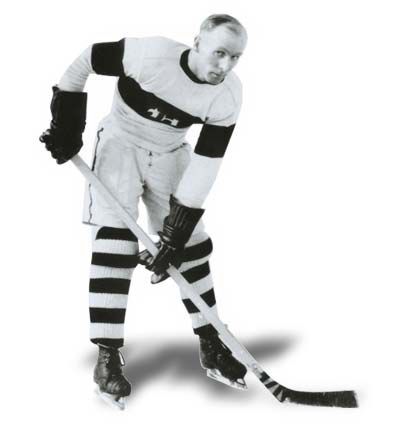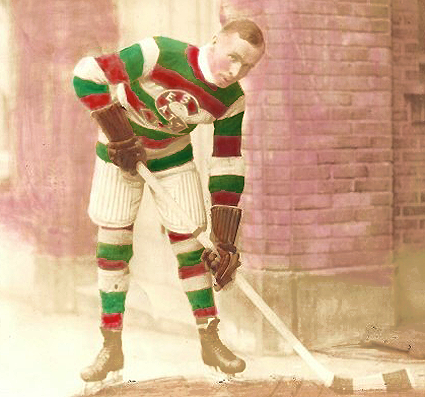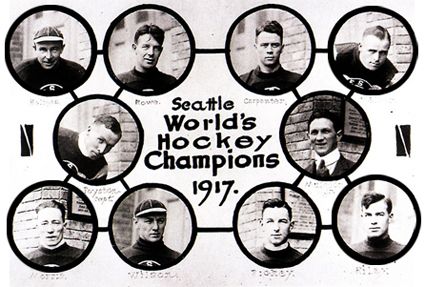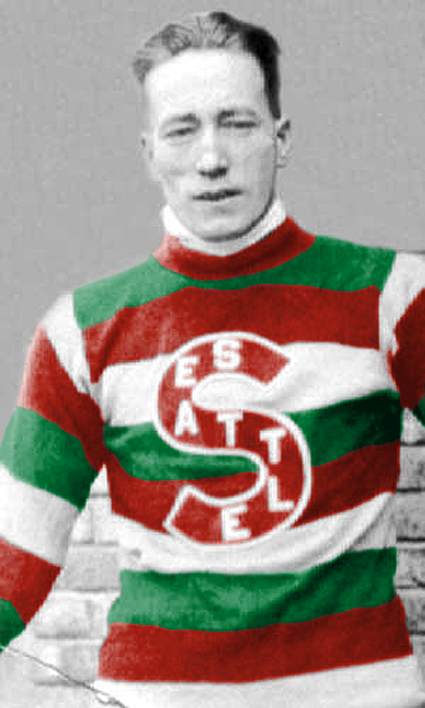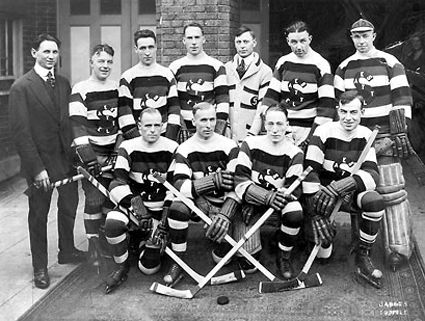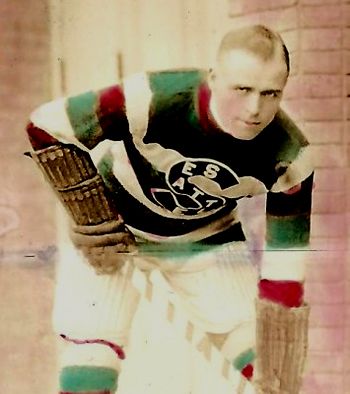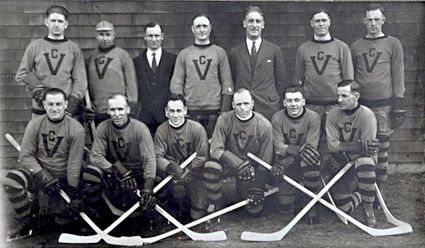The 1910-11 season saw Walker set a career high with 30 goals in a 14 game schedule. Port Arthur then challenged the Ottawa Senators of the National Hockey Association (NHA) for the Stanley Cup in a one game playoff on March 16, 1911. While Walker did manage to score a goal, Ottawa defended their rights to the cup with a 14-4 win.
Walker returned to Port Arthur for the 1911-12 season and scored his final 17 goals for the Bearcats in 13 games played.
For the 1912-13 season, Walker joined the Moncton Victorias of the Maritime Professional Hockey League where he had a fine season, totaling 21 goals in just 15 games. As a preview of what was to follow, Walker also played one game for the Toronto Blueshirts of the NHA.
Walker would move full time to the Blueshirts for the 1913-14 season and finish second on the team and fifth in the league in scoring with 20 goals in 20 games. Toronto would finish the season in first place with a 13-7 record. The Montreal Canadiens would also post a 13-7 record and the two teams would play a two-game, total goals series to determine not only who would be the league champion, but also take possession of the Stanley Cup, which was previously held by the Quebec Bulldogs of the NHA. While Montreal won the first game 2-0, Toronto stormed back with a 6-0 win in Game 2 to take the series and the rights to the Stanley Cup.
Three days later, the Blueshirts were back on the ice defending the cup against the Victoria Aristocrats of the Pacific Coast Hockey Association (PCHA) in a best-of-five series held in Toronto. The Blueshirts took Game 1 by a score of 5-2 played under five man NHA rules with Walker contributing a goal for Toronto. Game 2 was a closer affair, played with the PCHA's six man rules that added the Rover to the mix. The game went to overtime tied at 5-5 before Toronto prevailed after 18 minutes of extra time for a two game lead. Toronto then secured the cup with a 2-1 win to sweep the series in three straight. Walker and the other Blueshirts each received a $297 bonus as their share of the gate receipts.
Walker was back with the Blueshirts for the 1914-15 season, during which he scored 12 goals and was credited with 7 assists for 19 total points in 19 games. The Blueshirts finished mid-pack and were obliged to relinquish their hold on the Stanley Cup.
After playing their first four seasons as a three team league, the PCHA added a fourth team for the 1915-16 season, the Seattle Metropolitans. Needing to stock their roster with players for their inaugural season, the Metropolitans targeted the Blueshirts, and convinced Eddie Carpenter, Hap Holmes, Frank Foyston, Cully Wilson and Walker to all move out west to Seattle.
Walker finished second in team scoring and ninth in the league with 13 goals and 19 points in 18 games during his first PCHA season.
The Metropolitans would finish first in the league with a 16-8 record as Walker was third on the team in scoring, contributing 11 goals and 26 points in 24 games. As the league champions, Seattle faced off against the Montreal Canadiens of the NHA for the Stanley Cup in a best-of-five series held in Seattle.
While the Canadiens stormed to a 8-4 win in Game 1, the next three games were all Metropolitans as goaltender Holmes only allowed Montreal a single goal in each of the next three games, while Seattle scored 6, 4 and then a resounding 9 to win the series 3 games to 1 for the second Stanley Cup of Walker's career.
The outbreak of World War I interrupted Walker's hockey career and he only played a single game of the 1917-18 season. He was back full time with the Metropolitans for the 1918-19 season, and scored 9 goals and 15 points in 20 games. Seattle came in second to the Vancouver Millionaires during the regular season, but defeated them in the playoffs 7-5 during a two-game, total goal series. The Metropolitans advanced to once again face off against the Canadiens.
After Seattle dominated Game 1 7-0 under PCHA rules, during which Walker played at the Rover position, Montreal evened the series with a 4-2 win in Game 2. Seattle again dominated under PCHA rules 7-2. Game 4 ended in a 0-0 tie after Holmes of Seattle and Georges Vezina were both perfect after 60 minutes of regulation and 20 minutes of overtime. The fifth game went to Montreal 4-3, but the remainder of the series was cancelled when five Montreal players were hospitalized due to contracting influenza, with the Canadiens "Bad" Joe Hall passing away four days later. Montreal manage George Kennedy informed those in charge that the Canadiens were forfeiting the cup to Seattle, but Pete Muldoon, the manager of the Metropolitans refused to accept in under such circumstances. The engraving on the cup for 1919 reads "Series Not Completed".
Assuming a more defensive role for the Metropolitans, Walker's offensive numbers reflected the change in his focus, and he was limited to 4 goals and 12 points in 22 games of the 1919-20 season. Seattle won the PCHA regular season and playoff, again coming from a 3-0 deficit after Game 1 to win 6-0 in the second game to return to the Stanley Cup Final after a 6-3 win. Seattle traveled east to play the Senators, with the first three game in Ottawa. The Senators won the first two, 3-2 and 3-0, before the Metropolitans took Game 3 by a score of 3-1. The series was then moved to Toronto in search of better ice conditions. Seattle then tied the series at 2 games each with a 5-2 win to force a Game 5, which went to Ottawa 6-1.
Over the course of the next four seasons, Seattle would participate in the PCHA playoffs three times, losing to Vancouver each time. Walker only managed 6 goals and 10 points in 1920-21 followed by 8 goals and 12 points in 1921-22, but then he had an offensive resurgence, scoring 13 goals and 23 points in 1922-23 followed by 18 goals and 23 points in 1923-24, which proved to be the final season for both the Metropolitans and the PCHA.
While Seattle folded, both the Victoria Cougars and the Vancouver Millionaires, now known as the Maroons, both joined the Western Canada Hockey League (WCHL) and Walker signed on with Victoria for the fourth season of WCHL play and contributed 7 goals and 7 assists in 28 games. While the Cougars finished third in the regular season, they defeated the Saskatoon Crescents 6 goals to 4 in the Semifinals and then defeated the Calgary Tigers 3 goals to 1 to earn the right to face the Canadiens for the Stanley Cup in a best-of-five series.
Game 1 in Victoria went to the home team 5-2 and they put Montreal on the ropes with a 3-1 win in Vancouver in Game 2. Montreal stayed alive with a 4-2 win in Game 3, again in Victoria before the Cougars became the last team from outside the NHL to win the Stanley Cup, the third of Walker's career, with a decisive 6-1 win in Game 4 to take the series 3 games to 1. During the four games of the Finals, Walker scored 4 goals and 6 points. Adding in the 4 goals he scored during the Cougars 4 WCHL playoff games, Walker had more goals during the 8 postseason games he played, 8, than he did during his WCHL 28 regular season games, 7.
Not only was it Walker's third Stanley Cup, but it was done with his third different team that originated from three different leagues! To this day, Walker remains one of just 11 players to have ever won the Stanley Cup as a member of three different clubs.
The following season of 1925-26 was a virtual repeat, as Walker scored 9 goals and 17 points as Victoria again finished third but won the WCHL playoffs to return to the Stanley Cup Finals against Montreal, only this time it was the Montreal Maroons, not the Canadiens. Montreal had the upper hand however, taking the cup with a 3 games to 1 victory.
The WCHL, under financial duress, folded at the end of the season. Meanwhile, in the east, the NHL was in the process of expanding further into the United States. For the 1926-27 season, the Chicago Black Hawks, New York Rangers and Detroit Red Wings were added to the league to join the New York Americans, Pittsburgh Pirates and Boston Bruins. Detroit's roster was stocked with the roster of the Victoria Cougars, which explains the Detroit franchise using the Cougars name in recognition of the source of their roster. All of this maneuvering led to Walker moving east to become a member of the Detroit club in now his sixth different league.
In 37 games, Walker scored 3 goals and 7 points while focusing on his renowned defensive abilities. He remained with the Cougars, who would later change their name to the Falcons and then settle on the Red Wings, for a second season, playing in 43 games scoring 2 goals and 6 points.
Walker obtained his release from Detroit in order to move back west for the 1928-29 season to join the new Seattle Eskimos franchise that would play in a new league, the Pacific Coast Hockey League, which was coached by the same Muldoon, his old coach with the Metropolitans. In 34 games he scored 5 goals and 13 points. He played two more seasons with the Eskimos, 1929-30 and 1930-31 and led the league in assists despite now being in his 40's.
The Eskimos folded after the 1930-31 season, bringing an end to Walker's playing career. He did continue in hockey as a linseman and referee over the next ten years.
While he only played in two NHL seasons, Walker enjoyed a long and successful career in the formative days of professional hockey, which included winning the Stanley Cup on three different occasions, noteworthy since they came with three different teams in three different leagues. In all, Walker played in 364 games in the top level NHA, PCHA, WCHL and NHL, scoring 135 goals and 104 assists for 239 points.
A year before his passing, Walker was inducted into the Hockey Hall of Fame in 1960.
Bonus jersey: Today's bonus jersey is a 1924-25 Victoria Cougars Jack Walker jersey. The Cougars began life in 1911 original members of the Patrick's PCHL. Two seasons later they adopted the name Aristocrats until 1916. With the outbreak of World War I, their arena was taken over by the Canadian military, which forced a move to Spokane, Washington as the Canaries for a year, after which the club folded.
Today's video section is a look at the history of hockey in Seattle.

